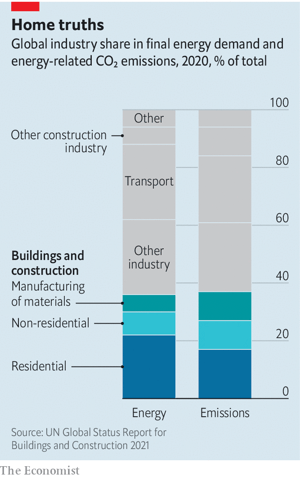
Happy Tuesday. We feel algae deserves a bit more appreciation – did you know it’s used to make jet fuel, vegan eggs, food colouring, running trainers… and concrete?!
In today’s edition:
🚔 Greenwashing & police raids
🧱 Concrete making Algae
🏗 A new approach for the property industry

President Biden invokes Defense Production Act (DPA) to accelerate domestic manufacturing of clean energy
The DPA: A 71-year-old-law permits the White House to deem certain materials essential for national defence and coordinate with industry to obtain those goods (same one President Trump used to support coal plants). In this case the act is deployed to increase the US’s energy security.
What does it mean? The act provides access to a government money-pot ($900bn) which serves as a guaranteed buyer (at any price) for clean energy tech. It also demands businesses must fulfil government contracts ahead of others. This incentivises private businesses to quickly scale production of clean energy products including solar and heat pumps.
Importance: Rather than focussing on preventing bad actors, climate policy is increasingly about incentivising good ones. A short-term cash injection in lieu of long term legislation. A start!

More allegations of greenwashing leads to police raids
Asset manager DWS, and its majority owner Deutshe Bank, were raided as part of a probe into potential greenwashing
What are the details? DWS have allegedly made misleading claims in its 2020 annual report that over half the the group’s $900bn assets were invested using ESG criteria.
The immediate consequences? Reports of the raid have had an impact on both companies with the group’s shares falling by 7% while DWS’ CEO immediately resigned.
The importance: Scrutiny of ESG claims is being combined with more willingness to use police powers to gather evidence leading to a closer relationship between regulators and law enforcement – reducing the ability to hide unscrupulous activity relating to ESG investing.
EU to propose law to reverse decades of biodiversity loss ‘imminently’
Challenge: The EU has consistently missed its pledges to reverse the decline of nature on its territory. In 2021, only 15% of habitats had a ‘good’ conservation status.
What has changed: A leaked document about a new ‘nature restoration law’ would propose legally binding objectives to protect more of Europe’s ecosystems. 20% of the Union’s land and sea would be protected under law by 2030, and all ecosystems in need of restoration by 2050.
Why should we care: Healthy ecosystems help to mitigate global warming, prevent natural disasters, and strengthen food security.
🤖 Future of Tech (1-minute read)
Circular innovation aplenty
Japan’s Discarded Kimonos: Shifting fashion tastes and a declining consumer base have created a huge supply of vintage kimonos, which Japanese creatives are now crafting into modernised clothing.
Dutch Wind Turbine Blades: After 25 years of generation, blades from the Irene Vorrink wind farm just north of Amsterdam are to be made into snowboards, skis and construction materials for solar farms as Vattenfall AB starts a pilot project to improve sustainability of its turbines
- Kids Clothes: UK supermarket M&S Kidswear joins a peer-to-peer resale marketplace in bid to encourage ‘hand me downs’

Concrete blocks made from Algae
Prometheus Materials have secured $8mn in funding (investors incl. Microsoft) to develop a zero-carbon alternative to Portland cement (the most common type of cement used worldwide & the source of around 8% of global CO2 emissions) using microalgae. Over the next 2-years the company wants to create 2 products. Both products use naturally occurring microalgae combined with water, sunlight and CO2 to create a bio-cement. The material has similar mechanical and thermal properties to coral. They estimate that the bio-cement creates 90% less carbon compared to Portland-cement based products.
💡Deep Dive (1-minute read)
Building a new approach: Reducing the property industry’s massive carbon footprint
A host of problems:
Heating, cooling and powering existing homes, offices & factories account for 27% of global energy-related carbon emissions.
Constructing new property and demolishing old ones accounts for 10% of global CO2 emitted each year.
Only a tiny fraction of properties are carbon neutral and current trajectories suggest it will take 100 years to decarbonise the rest.
A dirty building boom beckons as the world urbanises – one estimate suggests cities will need to add 13k houses everyday until 2050 to keep-up with global population growth.
What can be done? 3 potential solutions…
Incentivise owners to make existing property more energy-efficient: Retrofitting with insulation & smart control systems for heating/cooling can have an immediate impact. The UK government is encouraging energy efficiency measures by scrapping value-added tax (VAT) on insulation as well as issuing heat-pump grants to bring upgrades to price parity with boilers.
Data driven decisions: For example, when to retrofit buildings vs build new, using tools like Sweco which helps assess the impact of carbon emissions and design choices at the first stage of a project
Ensure construction of new buildings is cleaner than the past: Carbon taxes would force the entire construction supply-chain to reduce emissions and use innovative materials (as we discussed in this edition’s ‘Future of Tech’ section).
Time to start building a new approach: The good news is there’s lots of opportunity – new industrial process can reduce emissions from cement & steel. Better construction methods (i.e., prefabricated houses) are more energy and carbon efficient yet rarely used. All this shows that there’s room for fresh thinking (and profits to be made).

💭 Little Bytes
Quote: “The transition to a more circular economy is an essential contribution to the EU’s efforts to develop a sustainable, low-carbon, resource-efficient and competitive economy.” The journal Environmental Sciences Europe.
Stat: Clearing land to make way for palm oil farming is estimated to have caused 5% of deforestation to date in tropical areas.
Watch: Sweden is using VR to train its postal workers
🗞 In other news…
All new buildings in the UK to have electric car chargers from 2022 and EU Lawmakers Uphold Ban on New Combustion Engine Cars by 2035
Climate change: Bonn talks end in acrimony over compensation
Agribusiness Task Force: Sustainable Markets Initiative launches new regenerative agriculture push
Largest ever farm-led restoration projectlaunched in Kenya to restore 1.9mn hectares of land across 6 African nations
- UPS unveil battery-powered, 4-wheel “eQuad” to efficiently haul cargo in congested cities.
🎣 Gone Phishing
3 of these stories are true, 1 is not, guess which…
Gravestone for Internet Explorer goes viral
Uber release food delivery robots onto the streets
Elon Musk sued over alleged Dogecoin pyramid scheme
- Jeremy Clarkson plans hydrogen planton his UK farm




